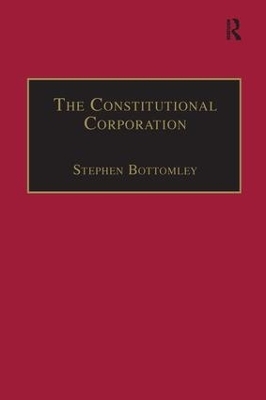
The Constitutional Corporation
Rethinking Corporate Governance
Seiten
2016
Routledge (Verlag)
978-1-138-24835-9 (ISBN)
Routledge (Verlag)
978-1-138-24835-9 (ISBN)
This book argues that instead of consigning shareholders to a passive role, they should be given opportunities to be active members of corporations. The ideas of accountability, deliberation and contestability provide a valuable framework for assessing corporate structures and process and for encouraging greater shareholder participation.
Corporate laws are based on the idea that the interests of shareholders should be the primary concern of company directors. However, some argue that the proper role for shareholders is to sit back and let the corporation's managers do their job, or that the pursuit of shareholders' interests detracts from the concerns of employees or victims of corporate wrongdoing or other stakeholders. Stephen Bottomley argues that instead of consigning shareholders to this passive role, they should be given opportunities to be active members of corporations. Corporations are constitutional arrangements rather than mere contractual agreements. They are decision-making organizations in which questions of process and structure are important. Thus, instead of using economic criteria such as efficiency as the sole measure for deciding what constitutes 'good' corporate governance, this book examines whether ideas of accountability, deliberation and contestability provide a valuable framework for assessing corporate structures and process and for encouraging greater shareholder participation.
Corporate laws are based on the idea that the interests of shareholders should be the primary concern of company directors. However, some argue that the proper role for shareholders is to sit back and let the corporation's managers do their job, or that the pursuit of shareholders' interests detracts from the concerns of employees or victims of corporate wrongdoing or other stakeholders. Stephen Bottomley argues that instead of consigning shareholders to this passive role, they should be given opportunities to be active members of corporations. Corporations are constitutional arrangements rather than mere contractual agreements. They are decision-making organizations in which questions of process and structure are important. Thus, instead of using economic criteria such as efficiency as the sole measure for deciding what constitutes 'good' corporate governance, this book examines whether ideas of accountability, deliberation and contestability provide a valuable framework for assessing corporate structures and process and for encouraging greater shareholder participation.
Stephen Bottomley is Professor of Commercial Law and Head of School in the Law School at the Australian National University, Australia. He has published in the areas of corporate governance, corporate theory, corporate regulation and government-owned enterprises.
Chapter 1 Corporations and Shareholders; Chapter 2 From Contract to Constitution; Chapter 3 Corporate Constitutionalism; Chapter 4 Corporate Accountability; Chapter 5 Corporate Decisions and Deliberation; Chapter 6 Contesting Corporate Decisions; Chapter 7 The Prospects for Corporate Constitutionalism;
| Erscheinungsdatum | 07.09.2016 |
|---|---|
| Reihe/Serie | Applied Legal Philosophy |
| Verlagsort | London |
| Sprache | englisch |
| Maße | 156 x 234 mm |
| Gewicht | 453 g |
| Themenwelt | Recht / Steuern ► Allgemeines / Lexika |
| Recht / Steuern ► EU / Internationales Recht | |
| Recht / Steuern ► Wirtschaftsrecht ► Gesellschaftsrecht | |
| Wirtschaft ► Betriebswirtschaft / Management ► Unternehmensführung / Management | |
| Wirtschaft ► Volkswirtschaftslehre | |
| ISBN-10 | 1-138-24835-5 / 1138248355 |
| ISBN-13 | 978-1-138-24835-9 / 9781138248359 |
| Zustand | Neuware |
| Haben Sie eine Frage zum Produkt? |
Mehr entdecken
aus dem Bereich
aus dem Bereich
Kommentar
Buch | Hardcover (2024)
C.H.Beck (Verlag)
CHF 306,55


